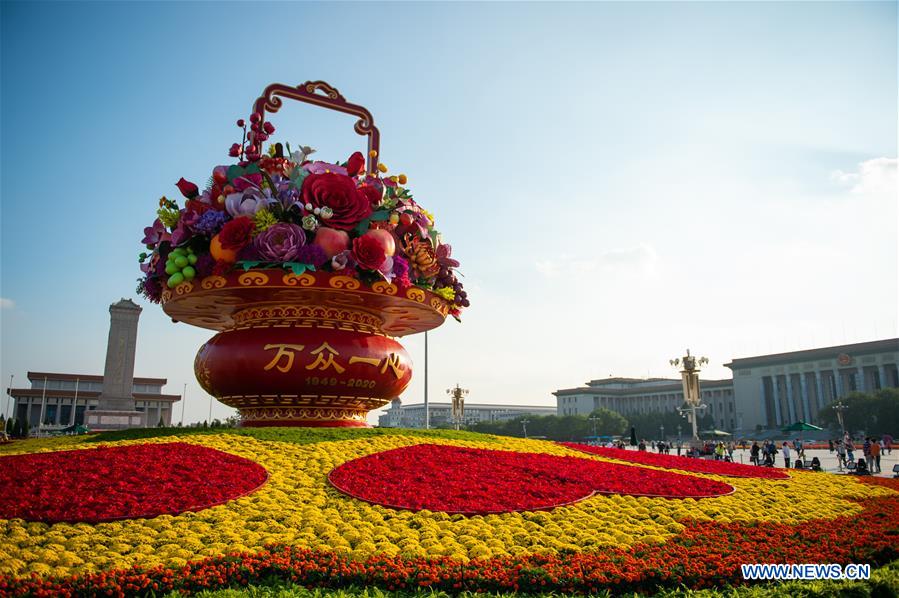As we look back at the PRC's establishment, we also look to its future
- By Tom Fowdy
 0 Comment(s)
0 Comment(s) Print
Print E-mail China.org.cn, October 1, 2020
E-mail China.org.cn, October 1, 2020

As the People's Republic of China celebrates the 71st anniversary of its founding, it's a good time to review what that event meant, why it matters, before looking ahead as the leadership contemplates a new five-year plan for the next phase of its development.
The establishment of the PRC was an accumulation of a century of major political and social change in China responding to pressures of the outside world, dramatic upheaval and a soul searching by its people who sought to modernize the country in order to revive itself. It was to be a "new China."
Thus, the new government endeavored itself to reshape and establish China as a modern nation state capable of developing itself and defending its national sovereignty.
This was a new beginning, embodying the dream of modernization and progress. Although this was not a vision capable of being achieved instantaneously, its foundation would nonetheless prove to be a break from the past. It was the beginning of a journey, even if it embodied various learning curves along the way. Now, 71 years later it is time to reflect on what has been achieved.
China has developed to become the world's second largest economy, if not the largest if one calculates GDP in purchasing power parity terms. The era of reform and opening-up launched in 1978 has pushed China on a trajectory of economic development drastically changing its fortunes.
It has widely expected to objectively become the largest economy by the end of this decade, and will be the only major economy to end 2020 with positive growth. Its average annual income has soured from just $89 in 1960, to over $10,000 currently. China now boasts the world's largest domestic consumer market, has become the world's largest exporter and manufacturer with $2.5 trillion worth of goods being shipped out in 2018.
China has also emerged as a leading center of research, science and technology. In 2020, it became the world's largest publisher of peer reviewed academic papers, accounting for 19.9%, which has surpassed the United States.
It has become a leader in the fields of artificial intelligence, 5G telecommunications, supercomputing, drones, robotics and much more. The quality of life for 1.4 billion people has been dramatically transformed, typified by an average life span of 76 in 2017 – near parity with the United States – from 43 years in 1960.
So, what of its future course? What needs to be done to sustain this progress? Looking ahead, China is endeavoring to continue to develop into a high-income country, which requires much more to be done. Its leaders will mark the anniversary by signing off on a new five-year plan for the national economy.
Building on the foundation of what has been achieved so far, the plan is likely to stress the continued development of the national consumer economy as the foundation of growth, comprehensively expand economic reforms in order to facilitate greater efficiency and foreign investment and focus on research and development whilst also hedging against a more challenging international circumstances and the fallout from the global economy mired in the COVID-19 pandemic.
Whilst China is well prepared, with huge resources, undoubtedly the geopolitical environment has changed and will pose new challenges to further progress, making the necessities of development different from in the past. This will require the five-year plan to be strategic and well organized. The future of the country may come with challenges, but it also comes with opportunities if the right decisions are taken.
Therefore, as a whole, 71 years of the People's Republic of China boasts huge achievements. Emerging from the desire to build China into a modern sovereign state, its leaders have undertaken a remarkable journey and whilst there have been ups and downs, there is little doubt on the remarkable transformation and feats of development it has undertaken.
Now, the leadership faces the challenge of sustaining that success in a climate of much more uncertainty, adversity and less favorability. The 14th Five-Year Plan will thus prove an instrumental turning point in the country's history.
Tom Fowdy is a columnist with China.org.cn. For more information please visit:
http://www.china.org.cn/opinion/TomFowdy.htm
Opinion articles reflect the views of their authors, not necessarily those of China.org.cn.
If you would like to contribute, please contact us at opinion@china.org.cn.






Go to Forum >>0 Comment(s)